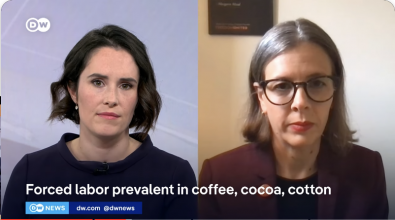As hundreds of Ecuadorian workers await a verdict in a milestone modern slavery case, Freedom United’s Executive Director, Joanna Ewart-James, sat down with German public broadcaster Deutsche Welle News to explain modern slavery in supply chains and everyday products.
Chances are you’ve used a forced labor product
The Deutsche Welle report follows landmark rulings on cases of exploitation in Ecuador at Furukawa Plantaciones C.A., a Japanese company that specializes in the production and exportation of abaca, a type of banana utilized for creating banknotes in 50% of the globe, operating in Ecuador for nearly 60 years. Plantation workers are seeking justice and reparations through lawsuits ongoing since 2021. U.N. human rights experts now stress that these cases are a crucial chance for Ecuador to rectify decades of exploitation and hold Furukawa Plantations C.A. accountable. Over 330 workers have faced forced labor, minimal wages, lack of basic services, and severe health issues for more than 60 years. The U.N. calls for stronger laws, effective labor inspections, and protection for human rights defenders facing threats and intimidation. A pivotal ruling is expected soon, which could offer hope and set a powerful precedent against forced labor.
The Japanese firm is not the only company profiting off worker exploitation in Ecuador. The banana industry alone is full of companies abusing workers in the pursuit of profits including forced child labor, withholding wages and suppressing labor unions.
A multitude of everyday products and services are tainted with forced labor, as explained by Ewart-James. The endemic and global problem of forced labor in supply chains is alarming – and the likelihood of buying forced labor products is immense.
“The chances are much smaller that we haven’t used a product that has been produced at some point with exploitation or slavery [than that we have].”
She further shared that the industries with the greatest abuses span a range of manufacturing and agricultural sectors, including cotton, coffee, and heavy metals in the DRC for electronics. Freedom United’s slavery map provides a comprehensive overview of regional products connected to modern slavery.
Increasing number of people in slavery
The Global Slavery Index estimates that 50 million people are currently in modern slavery, and this number is increasing. Ewart-James pointed out that the actual number is presumably much higher. When asked about reasons for the alarming rise in numbers, she pointed to unsafe migration routes, increased economic vulnerability, and high inflation.
“There is a real need to focus on ensuring that there are safe routes for migrants […] so that they are not squeezed into situations where they may take […] an opportunity that is actually exploitative.”
That’s why at Freedom United, we are calling on governments to implement genuine anti-trafficking immigration policies to end human trafficking.
Are you ready to join the fight? Sign today!





Freedom United is interested in hearing from our community and welcomes relevant, informed comments, advice, and insights that advance the conversation around our campaigns and advocacy. We value inclusivity and respect within our community. To be approved, your comments should be civil.